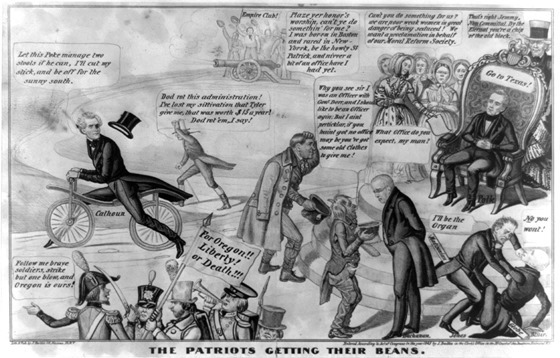January 3d.—Calm and quiet; indications of snow.
By a communication sent to Congress, by the President, it is ascertained that 500,000 pairs shoes, 8,000,000 pounds bacon, 2,000,000 pounds saltpeter, 50 cannon, etc. etc., have been imported since Octoberr 1st, 1864.
When the enemy’s fleet threatened Wilmington, the brokers here (who have bribed the conscript officers) bought up all the coffee and sugar in the city. They raised the price of the former from $15 to $45 per pound, and the latter to $15, from $10. An application has been made to Mr. Secretary Seddon to order the impressment of it all, at schedule prices, which he will be sure not to do.
Congress paid their respects to the President yesterday, by waiting upon him in a body.
There is a rumor of some fighting (12 M.) below, but I have not learned on which side of the river. It arises from brisk cannonading, heard in the city, I suppose.
I bought an ax (of Starke) for $15, mine having been stolen. I was asked from $25 to $35 for no better. Mr. Starke has no garden seeds yet.
The following article in the Dispatch to-day, seemingly well authenticated, would seem to indicate that our armies are in no danger of immediately becoming destitute of supplies; but, alas! the publication itself may cause the immediate fall of Wilmington.
“Blockade-Running.—Notwithstanding the alleged ceaseless vigilance of the Yankee navy in watching blockade-runners on the Atlantic and Gulf Coast of the Confederate States, their close attention has amounted to comparatively little. Setting aside all that has been imported on State and individual account, the proceeds of the blockade have been very great. The restrictions imposed upon foreign commerce by the act of Congress of last session prohibiting, absolutely, during the pending war, the importation of any articles not necessary for the defense of the country— namely: wines, spirits, jewelry, cigars, and all the finer fabrics of cotton, flax, wool, or silk, as well as all other merchandise serving only for the indulgence of luxurious habits,—has not had the effect to reduce the number of vessels engaged in blockade-running; but, on the contrary, the number has steadily increased within the last year, and many are understood to be now on the way to engage in the business.
“The President, in a communication to Congress on the subject, says that the number of vessels arriving at two ports only from the 1st of November to the 6th of December was forty-three, and but a very small proportion of those outward bound were captured. Out of 11,796 bales of cotton shipped since the 1st of July last, but 1272 were lost—not quite 11 per cent.
“The special report of the Secretary of the Treasury in relation to the matter shows that there have been imported into the Confederacy at the ports of Wilmington and Charleston since October 26th, 1864, 8,632,000 pounds of meat, 1,507,000 pounds of lead, 1,933,000 pounds of saltpeter, 546,000 pairs of shoes, 316,000 pairs of blankets, 520,000 pounds of coffee, 69,000 rifles, 97 packages of revolvers, 2639 packages of medicine, 43 cannon, with a large quantity of other articles of which we need make no mention. Besides these, many valuable stores and supplies are brought, by way of the Northern lines, into Florida; by the port of Galveston and through Mexico, across the Rio Grande.
“The shipments of cotton made on government account since March 1st, 1864, amount to $5,296,000 in specie. Of this, cotton, to the value of $1,500,000, has been shipped since the 1st of July and up to the 1st of December.
“It is a matter of absolute impossibility for the Federals to stop our blockade-running at the port of Wilmington. If the wind blows off the coast, the blockading fleet is driven off. If the wind blows landward, they are compelled to haul off to a great distance to escape the terrible sea which dashes on a rocky coast without a harbor within three days’ sail. The shoals on the North Carolina Coast are from five to twenty miles wide; and they are, moreover, composed of the most treacherous and bottomless quicksands. The whole coast is scarcely equaled in the world for danger and fearful appearance, particularly when a strong easterly wind meets the ebb tide.
“It is an easy matter for a good pilot to run a vessel directly out to sea or into port; but in the stormy months, from October to April, no blockading vessel can lie at anchor in safety off the Carolina Coast. Therefore supplies will be brought in despite the keenest vigilance.”



